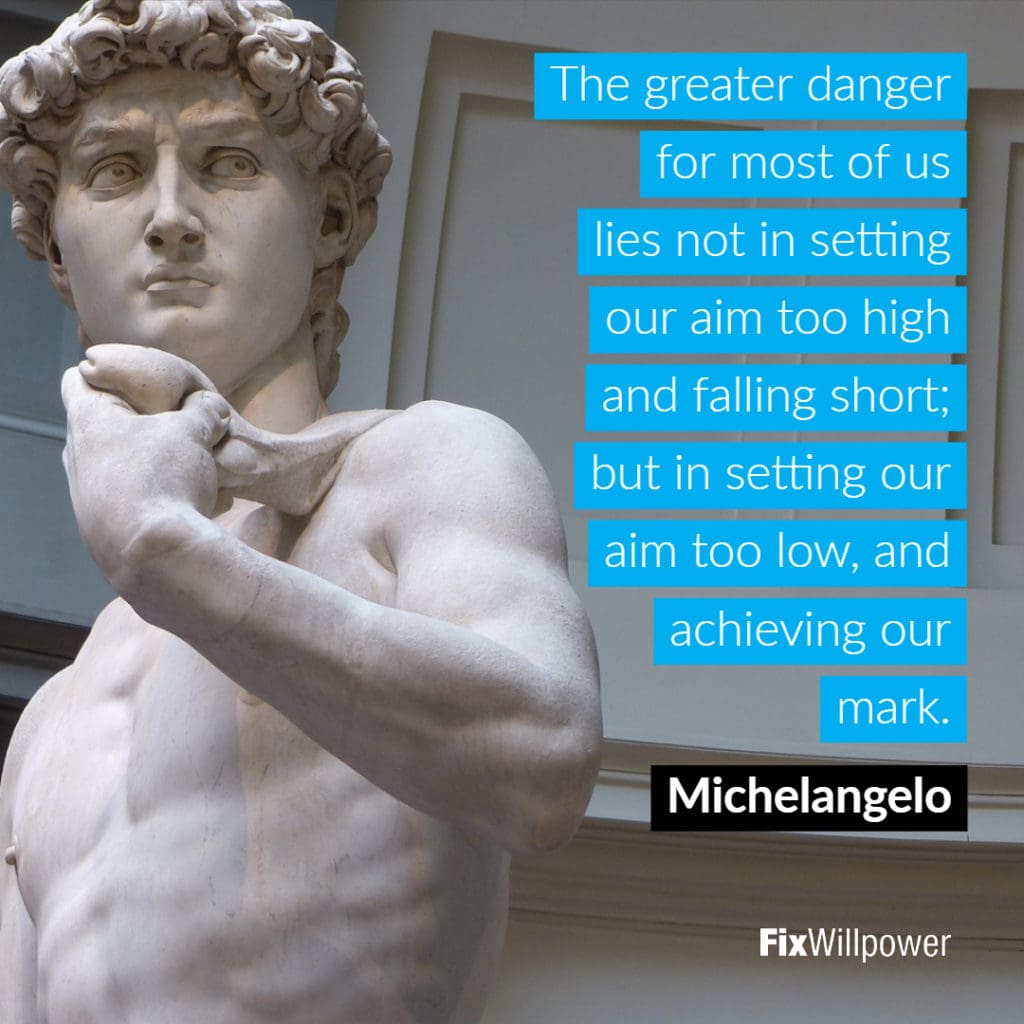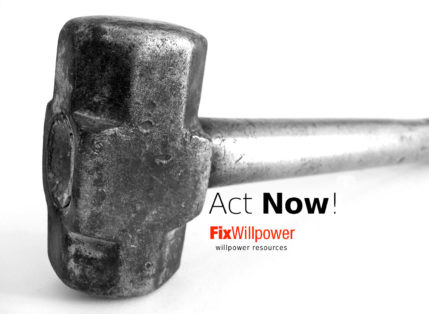Set goals and then write down your goals!
Research has shown that people who set goals perform better than the ones that don’t.
Goal setting will help you in many ways. Setting clear goals improves your performance at any task. Clear goals help you focus more on the task at hand and avoid distractions. Your enthusiasm is higher when you are working on clear goals.
Next, I’ll give you an overview how to set goals that inspire.

Why should you write your goals down?
Well-defined goals increase your persistence, helping you to get through rough patches and negative emotions. Also, setting a clear goal makes you more resourceful, helping you to find a better way to achieve the results you want.
For more information about the psychology of writing down goals, you can read a research paper on the effects of goal setting on college students (PDF). From this paper, you can find references to a lot more goal research.
After a 4-month period, students who completed the goal-setting intervention displayed significant improvements in academic performance compared with the control group.
Setting Goals High!
Setting goals that are too low will fill us with a feeling of contentment, and this means that our development stops. For Michelangelo, goals were important:

The greater danger for most of us lies not in setting our aim too high and falling short, but in setting our aim too low, and achieving our mark. ~ Michelangelo
Set your goal higher than it seems possible, but start with small steps. If you want to run a marathon, then it may seem impossible to reach from your current position. Start running 10 minutes a day, and run slowly, walk if it seems hard. Increase that time 5 minutes every month. In 12 months, you will run more than an hour without rest.
When I started running, I was walking my dog. I ran for 4 minutes, then walked for 4 minutes. So, I did that 25-30 minutes every time, and the results were quick to follow.
I suggest having no rest days and pick your tempo so you don’t need rest days. If your body is really tired, then just walk but get out there (and maybe take a few running steps). You will need the most willpower to get from the couch to a door. Everything else is pretty easy. I have found that getting out every day will help you maintain momentum. Your daily routine requires less willpower than doing less frequently.
Next year start increasing intensity, and you will be ready to run a marathon. I suggest that you use Hal Higdon’s Marathon Training Guide – Novice 1. Or use any other program for beginners.
How to set goals?
Write down your goals!
There’s a great mnemonic to help remember different elements of a clear goal. Many of you may know the SMART criteria. I will go over each aspect of the SMART goals and add comments from my experience.
Here is Why You Should Never Tell People Your Goals.
Here’s how to write down your goals template that helps you get going.
Specific
Specificity is the key in the clear goal-setting. What is the result, what do you want to achieve? Here are some example goals:
- “Lose 15 pounds” instead of “lose weight.”
- “Earn $200 more next month,” not just “earn more.”
- Not “exercise more” but “walk/run 25 minutes every day.”
- Replace “become a writer” with “write 500 words every day.”
- “Go to X with kids every weekend,” not “spend more time with family.”
Measurable
This derives directly from specific, and means that you can measure progress. Either you measure the things you do (write 500 words every day) or results you are getting (lost 2 pounds last week). What gets measured gets done, and every step in the right direction will motivate you to move on.
For example, I set a goal to write every day and noticed in a few days that it’s not really clear.
- What to write about?
- Should I write on a single topic or count a combined total of all writing?
- Does Skype chat count?
- How about a proposal for a client?
So I made the goal more specific and measurable by stating that I will write at least 2000 characters every day on a single topic that is not email, chat, proposal, or technical writing.
Actionable
There are different terms associated with the letter A. I have used the word actionable as it relates most directly to getting things done and knowing what you have to do next. Actionable goal means that you know what the next step is, and you can make that step.
If I want to start an airline, then I don’t know what the next step is. Instead, set a goal to create a list of requirements to start an airline. Try to make the next step small so it wouldn’t overwhelm you and keep you from taking it. The next step in “clean the house” is to clean my desk. Break large, vague goals into small, clear, and actionable goals.

The important thing in life is to have a great aim, and the determination to attain it. ~ Johann Wolfgang von Goethe
Relevant
You need a powerful “why” for your goal. What is the reason you want to achieve that goal? Ask yourself if this is really something you want. How will this goal help you be happier? Will it improve your overall quality of life and have a positive effect on you and others?
For example, you can count the pages in your favorite book in the next two hours. This is a goal that is:
- specific,
- measurable,
- actionable, and
- time-bound,
but it’s pointless and irrelevant.
Examples: I want to earn 5000 dollars every month because then I can travel to my dream locations. I write every day because I want to become a better communicator and write a book.
Time-based
If it does not have a deadline, then it is not a goal. Every goal you set has a timeline. There are different points you can set on that timeline:
- When do you start? The sooner, the better.
- By what time you want to achieve the goal? Estimate the time needed and add a 50% buffer.
- How often do you do it? Create a schedule and stick to it no matter what.
Keep in mind that we overestimate what we can do in short-term and underestimate what we can accomplish with our long-term goals. So, don’t set a goal to lose 20 pounds in a month.
“Want to” goals
If possible, set “want to” goals.
Reaching “want to” goals is more likely than getting to your “have to” goals, says psychologists Marina Milyavskaya, a professor at Carleton University.
“Want-to” goals don’t lead to as many temptations as “have to” goals.
It’s easier to focus on something you want. If it’s something you want to do, then you have the drive to achieve it. If you have to do something that you don’t really want to, then there’s a lot of temptation to skip the practice.
However, I have to disagree with the professor on the value of the willpower.
When I started running, I hated it. I had to muster all of my willpower, motivation, and self-control to get going. Now, more than ten years later, I want to run.
You have to build habits around your goals, and this will lead you to the results you expect.
But you still have to have willpower to get going.
Build momentum
Another example is a daily writing habit.
If you set your daily writing goal at 500 or a thousand words, then you might want to scale it back for the weekends. Maybe write just 50 or 100 words, but do it to trick your brain into thinking you are doing it daily.
Now take your first goal!
Now that you know how clear goals work, create a list of your own goals.
You don’t have to go all SMART about your list. Just write it down. Anything that comes to your mind will be OK at this stage. Just to get you started here are the different areas of life that you might want to concentrate on.
Long-term goals examples and areas:
- Body goals: health, looks, exercise
- Money goals: net worth, regular income, stuff you want
- Personal development: education, hobbies, and self-improvement
- Relationship goals: family, children, lifestyle
- Social: friends and community
- Professional development goals: career, ambitions, fields of interest
After you are done with the dreams and long-term goals, go over them one by one and try to make them SMART.
You may find that you have to break many dreams into more manageable goals, but that’s OK. Make them small enough that you will take the first step in achieving them.
One thing to remember is that you don’t have to treat the list of goals as a fixed set. You can always add new goals or drop the ones that have become irrelevant. If you are doing this for the first time, then you should revisit the list every few days and add more stuff.

Don’t overdo it. Don’t over-diet, over-exercise, overeat, overdo the makeup, and don’t stress out. ~ Cheryl Ladd
Create a plan to achieve your goals
Let’s say that the goal is to make 1 million dollars in 3 years, and enjoy financial freedom from then on.
OK!
This is a SMART goal.
Now what?
Break the goal into small steps that you can handle.
To get to 1 million dollars in 3 years, you would have to make 6,400 dollars every week. There are about 156 weeks in three years.
157 weeks times 6,400 equals 1,004,800 dollars.
It’s safe to assume that you will make more money per week next year than this week.
Let’s say you can make 1,000 dollars in the first week.
With a quick mental calculation, you can see that you need to increase your weekly income by 4,5% every week.
If you relentlessly keep compounding your income by 4.5 percent every week, then by the end of the third year, you will have 1 million dollars.
That is still fantasy.
All goals are fantasies until you create a concrete plan of steps that take you from here to there.
What will you do to get your first 1,000 dollars next week?
What will you do to get the 1,045 you need the week after that?
For most of us, this plan to get to 1 million in 3 years seems unrealistic.
Adjust the plan.
You can either lower the amount of money you want to make or extend the deadline.
Make the plan that you can actually follow. But make it scary.
If your plan is more than you can keep up with, then you will fail. Consistency is the key. Doing ordinary things without skipping will get you extraordinary results.
If you don’t have a plan, you are just daydreaming.
Don’t overdo it
When you are really motivated and write down all your goals, then you may overdo it. Too many goals is not a good thing because it often leads to multitasking.
You need to focus, select one or two goals that you can fit into your schedule.
Go back to your list, and decide what you want to do first. Move all other goals to “later”-pile.
If you take on too much, then you will miss your goals and lose motivation. It’s better to do less, but consistently.
Get a pen and paper or open a text editor and write down your goals.
______________________________
Image: Tahiti Sunset by twalmedia
Image credit: Michelangelo’s David by Jorge Castro
Image: Goethe in the Roman Campagna, 1787 painting by Johann Heinrich Wilhelm Tischbein

![Read more about the article Why You Should Pick Your Own Path [VIDEO]](https://fixwillpower.com/wp-content/uploads/pick-your-own-path-429x314.jpg)


Pingback: The Art of Stress-Free Productivity by David Allen [TED VIDEO] | Fix Willpower
Pingback: Improve Your Life #30: Pick Your Own Path | Fix Willpower
Pingback: Improve Your Life #27: Act Now! | Fix Willpower